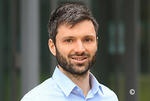One million euros for junior research group
Direktzugriff
Artikelaktionen
Dr. Severin Vierrath (Photo: W. Sperl)
Freiburg, Feb 03, 2020
According to the Intergovernmental Panel on Climate Change, all our activities need to be emissions-free by 2050 - and emissions of greenhouse gases like carbon dioxide have to be negative - if we are to prevent the worst effects of climate change and limit the global temperature increase to 1.5 degrees Celsius. Dr. Severin Vierrath wants to meet this challenge with a research approach focusing on two core innovations in CO2 electrolysis in order to significantly increase its efficiency. His approach should make it possible to convert the CO2 which is produced in large amounts in cement production, for example, into a usable product. The Vector Foundation is funding this approach with a one million euro grant over four years, during which time Vierrath will establish his own research group on this topic.
In conventional CO2 electrolysis, electricity is used to convert the carbon dioxide into usable chemicals, such as carbon monoxide and formic acid. The current is applied to two electrodes separated by a liquid electrolyte. However, this liquid electrolyte causes big losses, because CO2 is only soluble in small quantities and most of it cannot reach the electrode. Furthermore, the electrolyte cannot prevent the gas, as soon as it is produced, from migrating to the other electrode and being converted back to CO2. The new project aims to tackle both these challenges. A polymer membrane allows less gas to migrate back, while gas diffusion electrodes are flushed with CO2 gas, thus avoiding the problem of the low solubility of CO2 in the electrolyte.
The Vector Foundation offered funding for environmental solutions from science and technology disciplines. Its grants go to outstanding young researchers, giving them the opportunity to establish their own junior research groups in fields focusing on environment-related research in mathematics, computer science, the natural sciences and technology. The selection panel chose Severin Vierrath's "CO2-to-X" approach from a field of 21 competing applications. For four years, he will use the money to build his research group - in cooperation with the Freiburg Centre for Interactive Materials and Bioinspired Technologies (FIT), where he has been a Junior Research Group Leader since 2019.
The Electrochemical Energy Systems group, which is headed by Severin Vierrath and his colleague Dr. Matthias Breitwieser, develops materials for batteries, fuel cells and electrolysers at the Department of Microsystems Engineering (IMTEK) at the University of Freiburg and the Hahn-Schickard Research Institute.
Contact:
Dr. Severin Vierrath
Electrochemical Energy Systems Junior Research Group
Department of Microsystems Engineering (IMTEK)
University of Freiburg
Phone: 0761/203-54060
severin.vierrath@imtek.uni-freiburg.de
Fußzeile
Benutzerspezifische Werkzeuge

